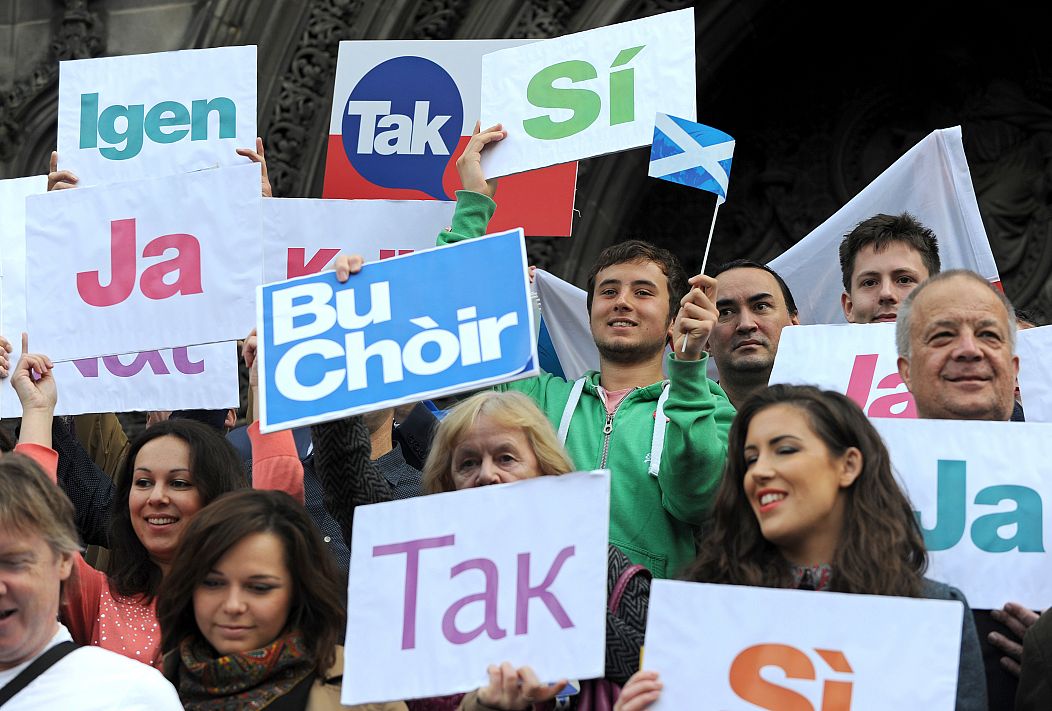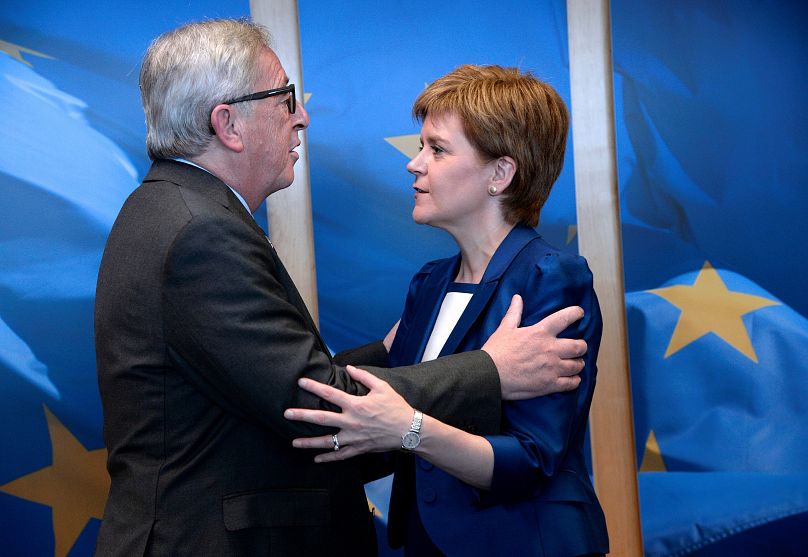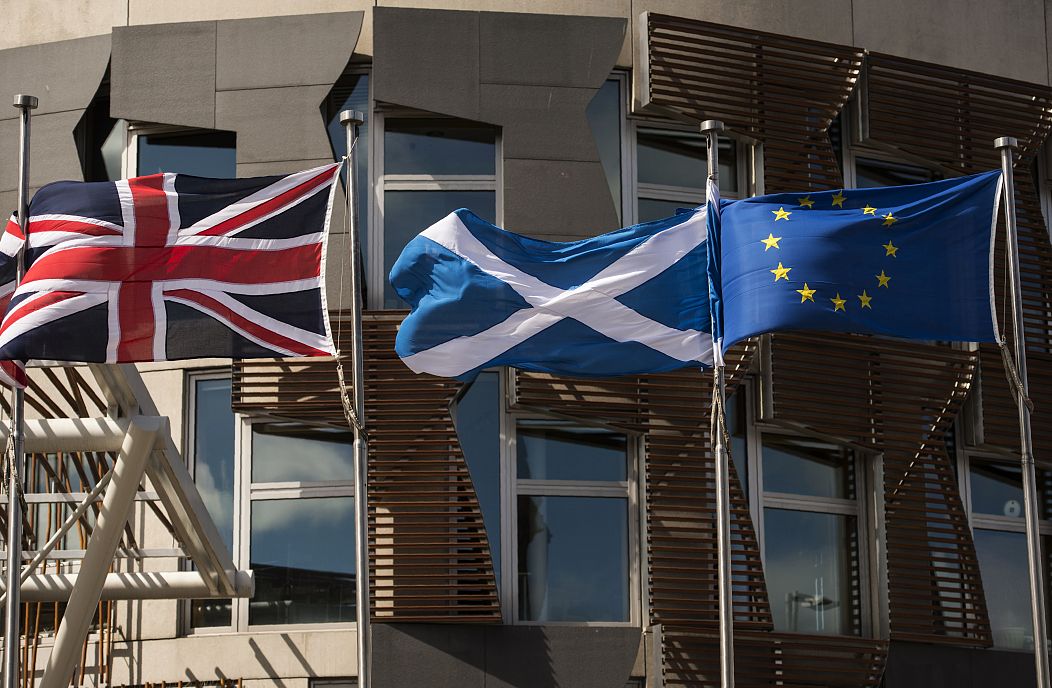Scotland and Brexit: 'People are embarrassed over what their friends from the EU have to go through'
A new study has found that EU27 citizens feel "safer and more welcome" living in Scotland than in England. We spoke to some of them to find out why.
"I want to take the opportunity this morning to speak directly to citizens of other EU countries living here in Scotland – you remain welcome here, Scotland is your home and your contribution is valued.”
These were Scottish First Minister Nicola Sturgeon's words to EU27 citizens living in Scotland on June 24, 2016, when Scotland awoke to discover that, despite a 62% vote to remain in the European Union, it was set to leave the bloc along with the rest of the UK.
Euronews spoke to three such EU nationals living in Scotland — scroll down to read about their experiences.
Scotland was the only one of the UK's four countries in which not a single constituency delivered a vote to leave, and the remain vote in the country's capital, Edinburgh, was the highest of any city in the UK at 74.4%. Scotland's largest city, Glasgow, voted 66.6% remain, while London's remain majority was 59.9%.
Research published last week by the University of Birmingham found that EU27 nationals felt safer and more welcome living in Scotland than in England, citing both the overwhelming remain majority, and the consistently reassuring message from Sturgeon's Scottish National Party (SNP) government to the 221,000 such citizens currently living in the country, as key reasons for this.
The report, EU Families in Scotland After the Brexit Referendum, found that EU citizens in Scotland perceived this difference in the security of their position in Brexit Britain, despite the same legal framework applying in Scotland and England – immigration is not a devolved matter, and is handled by the UK Government's Home Office rather than the Scottish Government at Holyrood.
The research – which involved interviews with citizens from Bulgaria, Spain, Italy, Greece, Denmark, Romania, Germany, Poland, Portugal, France, the Netherlands, Sweden and the UK – also pointed to consistently positive messages on migration and the EU in general from the Scottish Government.
Another key factor, according to the findings, was that EU nationals living in Scotland had been eligible to vote in the country's 2014 independence referendum, whereas they had been excluded from the 2016 EU referendum. Sturgeon's centre-left, pro-independence SNP – which has been in power in Scotland since 2007, with Sturgeon taking office as first minister in 2014 – has an ideology of civic, as opposed to ethnic, nationalism.
Co-author of the research, Professor Nando Sigona, chair of International Migration and Forced Displacement and deputy director of the Institute for Research into Superdiversity at the University of Birmingham, told Euronews that the difference in messages surrounding the EU referendum from the Scottish and UK governments was clear.
"The Scottish Government pushed a strong pro-EU message before and after the EU referendum," he said. "The main parties in the Scottish Parliament are all pro-EU, including the former leader of the Conservative party in Scotland [Ruth Davidson]. The message coming from the UK Government was much more ambiguous, and pledges to protect the rights of EU residents have been repeatedly breached."
Alice Guerard, 38, is originally from Paris and lives in the town of Dunfermline, Fife, 20 miles north of Edinburgh, with her partner, Bartek, originally from Poland, and their four-month-old daughter.
"I was born and raised in Paris. I fell in love with Edinburgh in 2011, with the Highlands in 2016 and decided to move here pretty soon after in January 2017. I was living in Leith, in Edinburgh, until this summer. Leith welcomed me with open arms and I found a job in a Swedish bar there as assistant manager.
"Being raised in a very busy city made me realise how much I valued the quality of life that Scotland could offer me. I can be on a beach, an island, a mountain without having to travel too far. I wasn’t really in a good place when I moved here, as I suffered from PTSD and depression, and the people and the landscapes put me back on track. In fewer words, I feel at home.
"I was in Indonesia when the Brexit vote happened. I cried for an entire evening, I couldn’t believe it. I just felt like the whole world had gone mad and that people have really short memories. Even when I was living in Paris, I felt more like a European citizen more than a French girl. Living in Scotland has made me proud of it.
"I think most of the Scottish people I know feel profoundly connected to Europe, and in Edinburgh and Glasgow, the society feels quite cosmopolitan. Not just with Europeans, but with the whole diversity the world can offer. The differences are perceived as beneficial. I didn’t hear about the same horror stories that are happening in England happening here.
"The solidarity, friendliness and kindness I have found here is amazing. I didn't have any negative experiences until last autumn, when someone told me to go back to Poland, where they assumed I was from. I had refused service to the individual as he was obviously very intoxicated. Brexit hasn't changed how I feel about being here at all, I love Scotland, and most of the people here didn’t vote for Brexit.
"I have tried to apply for settled status but every time I try, something happens. Right now there is a message on the site saying: 'Service unavailable: This online application is currently unavailable due to planned maintenance. Please try again later.'"
Holyrood's position on Brexit
The Scottish Government's Brexit web page states somewhat ambiguously: "The UK may be leaving the European Union," while the UK Government's equivalent page reads: "The UK will leave the EU on 31 October 2019." Holyrood has been repeatedly unequivocal in its opposition to the prospect.
Further to her open letter published the day after the referendum, Sturgeon again directly addressed EU27 citizens living in Scotland the following month. She wrote: "I would like to assure you that the Scottish Government is pursuing every possible option to protect Scotland's position in Europe and, by extension, the interests of the people from across the European Union who live here.
"The immediate status of EU nationals living in Scotland has not changed and you retain all the same rights to live and to work here. I believe those rights for the longer term should be guaranteed immediately and have written to the Prime Minister [then David Cameron] and all of the candidates to succeed him, calling for all EU citizens living here to be given an assurance that their residency will be unaffected."
Prof Sigona's study found that these letters have had a lasting effect on how European citizens in Scotland feel about living there. One Danish national he interviewed said: "I was feeling really depressed but then I remember how Nicola Sturgeon went on [TV] the next morning and spoke directly to EU citizens in Scotland and [said] it’s your home and so on, and that was really reassuring."
The Scottish Government earlier this year launched the Stay in Scotland campaign, designed both to encourage EU27 citizens to stay in the country after Brexit, and to give them guidance on how to do so. It pledged £250,000 (€281,192) for the initiative, to be spent on community-based support across the country.
Announcing the campaign, Sturgeon said: "Although immigration is a reserved issue, as a nation, Scotland has a long history of welcoming people of all nationalities, and while the Scottish Government unfortunately does not have the power to simply grant the right to remain for those that seek it, we do want all those who have made their lives here to be able to stay."
The Home Office reports that around a quarter of EU27 citizens living in Scotland have so far applied to remain in the UK after Brexit under the EU Settlement Scheme.
The Scottish Government previously also pledged £800,000 (€899,952) of funding to Citizens’ Advice Scotland to deliver an advice service to non-UK EU nationals, and backed the EU Citizens’ Rights Project, which organises events to raise awareness of how to stay in Scotland after Brexit aimed at vulnerable citizens, to the tune of £50,000 (€56,247).
Dr Mireille Pouget, who is originally from France and has lived in Scotland since 1976, represents EU citizens' rights campaign group The 3 Million in Scotland. She notes that the Scottish Government feels more approachable to groups such as hers, in comparison with the UK Government.
She told Euronews: "The Scottish Cabinet organised an event in Edinburgh in August 2016, after the vote, for EU nationals. The hall was full and the Cabinet was there in its entirety, fielding question after question from anxious EU citizens. It was impressive, and great to be able to meet ministers afterwards.
"We could not have a more approachable Minister for Europe in Ben Macpherson. He came to a community meeting in Edinburgh about EU citizens’ rights also attended by MP Joanna Cherry – it was in her constituency – last November. It was a very small event so I was quite surprised when he turned up.
"With the new Johnson government, there are no channels of communication with the UK Government. The Home Office is equally difficult to communicate with. [With the Scottish Government] we have monthly phone meetings to update each other [on our] activities and discuss current initiatives such as [settled status]. There is just no comparison."
Jan Grüter, 39, is originally from Germany and moved to Scotland from London in September 2018. He lives in Finnieston, Glasgow, with his husband.
"I came to the UK from Germany in 1996, aged 16. Initially, the plan was just to spend a year at boarding school to polish my English but I stayed on and finished my A-levels and got a place to read law at university. After uni, I worked in law in the city for many years.
"In the few years before our move up to Scotland, my husband and I had talked a lot about leaving the rat race in London and pursuing a better quality of life. We considered a few options including a move abroad but fell in love with Scotland, and Glasgow in particular, after visiting several times. In the end, there was a good opportunity for us job-wise up here and we decided to make the move.
"I think EU citizens are made very welcome here. I haven't had any negative experiences at all. I can understand the causes for [the Brexit vote], which I see as increased economic inequality in our society. Sadly, Brexit won’t solve these, and it feels like the country is now bitterly divided.
"The Scottish Government has gone out of its way to reiterate that EU citizens are welcome – and are in fact essential to the Scottish economy – and has played a very constructive role. I think the fact that the government has been so clear in its support for EU citizens has made me feel more welcome here. Brexit has made me more open-minded to Scottish independence as a mechanism to rejoin the EU. After all, a huge majority of Scots voted to remain.
"I applied for and obtained British citizenship shortly after the Brexit referendum so I now have dual citizenship. I plan to stay but wouldn’t rule out moving back to Europe at some point. I am worried about the economic consequences [of Brexit] and the divisions in society."
Scotland's looming population crisis
Practical as well as ideological reasons are driving the Scottish Government's pro-Europe stance, in a country with an ageing population and the resulting labour shortage looming. Scotland’s population is at an all-time high of 5.4 million, but it recorded its lowest birth rate since records began this spring – and 80% of EU nationals in Scotland are of working age, compared to 65% of the Scottish population as a whole.
In its response to a call for evidence on the role of EEA workers in the UK labour market from the UK Government's Migration Advisory Committee in October 2017, the Scottish Government stated that Scotland was dependent solely on migration for population growth over the next ten years. In contrast, for the UK as a whole, 46% of population growth was projected to come from births outstripping deaths.
This dependency, at odds with the rest of the UK, has informed the Scottish Government's attitude to immigration as a whole, in turn resulting in a marked contrast with the language used around the issue by the UK Government.
Prof Sigona's study found that, while "this vision of Scotland is more a political aspiration than necessarily a reality, and serves the agenda of an independent Scotland... with the difference in public attitude between UK nations smaller than the political rhetoric of their government(s) let us believe," this rhetoric had a profound effect on how his interview subjects felt about their identity as immigrants in Scotland.
He said: "The Scottish Government’s message on immigration is more positive and newcomers are valued and welcomed in the Scottish nation. A number of our interviewees pointed out that it is easier to be Scottish and French, Scottish and German, Scottish and Pakistani, but you never hear anyone saying they are English and French, English and German."
Rhetoric or reality?
In the immediate aftermath of the Brexit vote, Police Scotland reported that it had not witnessed any increase in hate crimes in Scotland. Scottish police received 119 reports of hate crimes in the week following the referendum, and 116 in the week preceding it. In the same week the previous year (2015) it received 143 such reports. In contrast, it was reported that hate crimes in England rose by 20% in the week following the vote to Leave.
However, Prof Sigona's interview subjects did report negative experiences related to being an EU national in Scotland. "Both in Scotland and England, people reported negative experiences, particularly verbal abuse from drunk people," he told Euronews.
"Parents reported that their children, in some cases, felt uncomfortable speaking to them in their mother tongue in public. People referred often to being frustrated and saddened by negative headlines on the EU and EU citizens in newspapers in England, which made them feel unwelcome."
Prof Sigona added, however, that there was a marked difference in the perception of such events among those living in Scotland. "While in England, those who had experienced abuses saw them as evidence of the overall hostile environment to foreigners, in Scotland people saw them as isolated cases," he said.
Ben Macpherson MSP, Scotland's Europe and Migration Minister, told Euronews: “People who have settled in Scotland from elsewhere in the EU significantly enrich our society and make a huge contribution to Scotland’s economy and public services. They’re our friends, neighbours and colleagues and we really want them to stay.
“The UK Government’s ‘hostile environment’ immigration policies are deeply damaging to Scotland, and any Brexit will only exacerbate this. It is increasingly clear that the UK Government is incapable of delivering effective immigration policies that reflect Scotland’s values, circumstances or interests. Therefore, it is time for Scotland to have the powers to deliver tailored immigration solutions that meet Scotland’s needs and aspirations.”
The Home Office declined to comment for this article, saying that the research and its findings do not refer to the department or its work.
Lisa (last name withheld) is 26 and originally from Germany. She has been living in Glasgow for three years after originally moving there to study and works for a public sector organisation.
"At the time of the referendum, I was still living in Germany and was just about to move to Glasgow to start my master's degree. The referendum result certainly came as a shock, and I was worried about my imminent move to a country that might not actually want me. The fact that I was moving to Scotland, though, was a bit of a relief. I might have reconsidered a decision to move to another part of the UK.
"I’ve always felt welcome and wanted here, by the people as well as by the Scottish Government. Having a strong and determined government behind us really makes a difference. My constituency in Glasgow voted 78% in favour of remain. Even though this sadly doesn’t seem to count for anything in political terms, it matters greatly to me and how I feel here.
"I’ve been subjected to a few careless remarks from people generally about immigrants or foreigners, which has been very hurtful, but all my friends are incredibly supportive and encouraging. Often people are embarrassed over what their friends and peers from EU countries have to go through.
"My work has issued guidance for EU staff and and their managers, offering support. This includes, for instance, time off for any appointments that may arise in the course of applying for settled status. Many would probably regard this as an HR box-ticking exercise, but I still find it encouraging and positive that they are trying to make their staff feel more at ease.
"I haven't applied for pre-settled status so far, which is almost entirely an issue of principle for me. European friends that have shared my view on this have recently decided to apply before October 31, intimidated by conflicting messages from the UK Government.
"Living in a country that voted decisively to remain is a big relief and makes me feel safe and at home. I couldn’t live in any other part of the UK at the moment. This is despite the fact that the views of my friends from other parts of the UK don’t differ from those of my Scottish friends; they are all vehemently opposed to Brexit. Ultimately though, I believe that EU citizens in Scotland will be better protected than in the rest of the UK."













